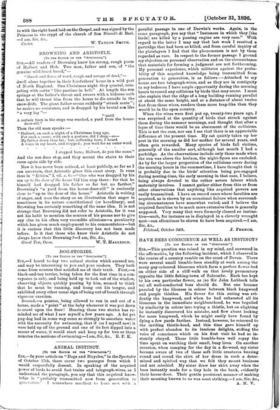BROWNING AND ARISTOTLE. [To THE EDITOR OP TEl SPECTATOR:] SIR,—All
readers of Browning know his strong, rough poem of Halbert and Hob. Two men, father and son, of "the
genuine wild-beast breed,"—
" Harsh and fierce of word, rough and savage of deed,"—
dwell alone together in their forefathers' home in a wild part of North England. One Christmas night they quarrel, com- peting with oaths "like pastime in hell." At length the son springs at the father's throat and swears with a hideous oath that he will thrust him from the house to die outside in the snow-drift. The giant father seems suddenly "struck mute "; he makes no resistance, and is dragged by his brutal son like "a very log "— " until A certain turn in the steps was reached, a yard from the house- door-sill."
Then the old man speaks :—
"Halbert. on such a night of a Christmas long ago,
For such a cause, with such a gesture, did I drag—so- My father down thus far; but, softening here, I heard
A voice in my heart, and stopped; you wait for an outer word.
I stopped here; Halbert, do you the same."
And the son does stop, and they mount the stairs to their room again side by side.
Now it has never been noticed, at least publicly, so far as I can ascertain, that Aristotle gives this exact story. It runs thus in "Ethics," I. vii. c. 6:—" One who was dragged by his
son up to the door of the house bid him stop there : for that he himself had dragged his father so far but no farther." Browning's "a yard from the house-door-sill" is curiously close to "up to the door of the house." Aristotle is writing of anger, and uses the story as an illustration that anger is sometimes in its nature constitutional (or hereditary), and Browning has certainly something of the same idea. It is not strange that Browning did not refer to Aristotle, for it was not his habit to mention the sources of his poems nor to give any clue to his often very recondite allusions—a peculiarity which has given much employment to his commentators—but it is curious that this little discovery has not been made before. Is it that those who know their Aristotle do not always know their Browning ?—I am, Sir, &O.,










































 Previous page
Previous page